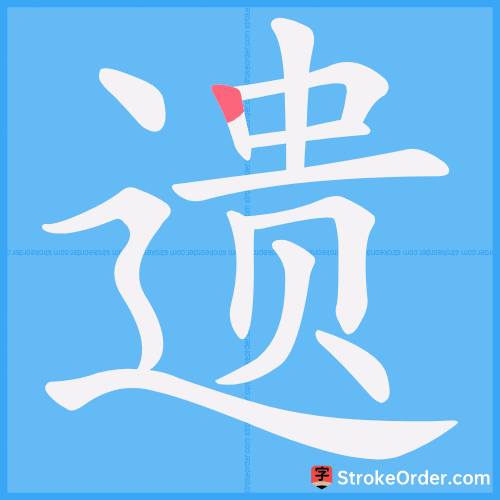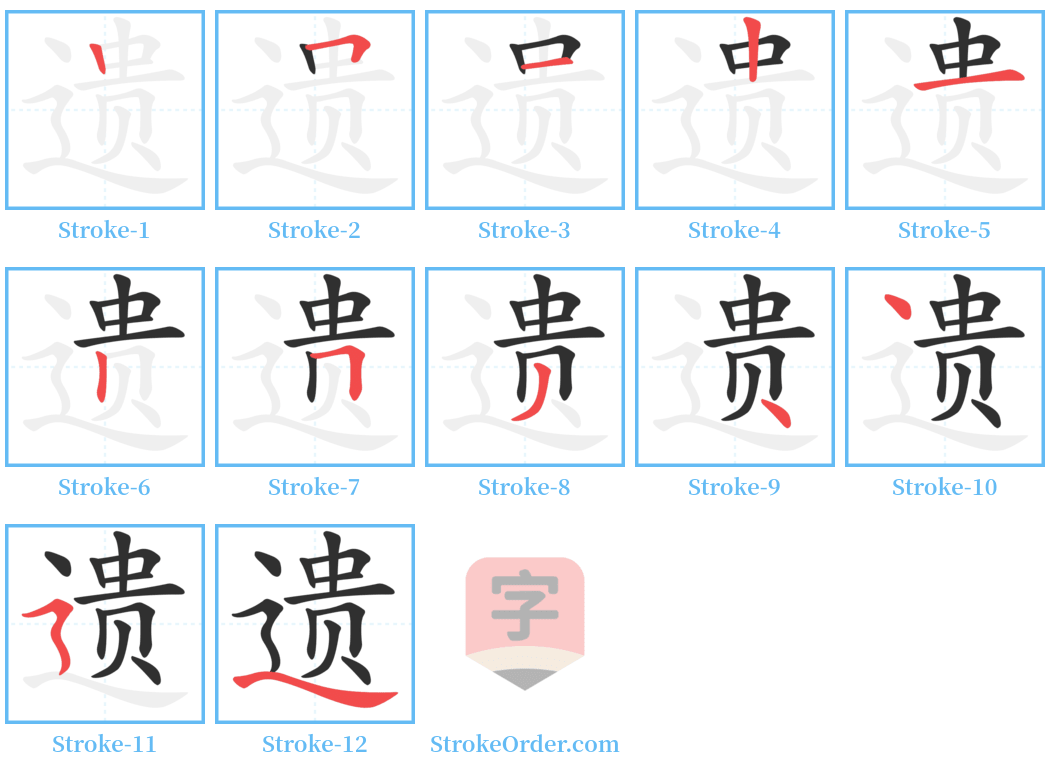遗 Stroke Order
Animated Stroke Order of 遗

Stroke Order Diagrams for 遗

Step-by-Step Handwriting Guide for 遗

Learn to Write Chinese Characters with Video Tutorials
Watch the video of writing the Chinese character "遗", learn the correct stroke order (笔顺) of the character "遗", and master the standard way of writing the character "遗".
Free Printable Handwriting Practice with Stroke Order: 遗
Printable Writing Practice Worksheet of "遗" in Portrait Orientation (Tian Zi Ge)

Printable Writing Practice Worksheet of "遗" in Landscape Orientation (Tian Zi Ge)

Information of 遗
Pinyin
yí、 wèi
Radical
辶
Strokes
12 strokes
Usage
★★★★★
Definition
to lose / to leave behind
遗
yí
1. To lose; to misplace.
2. To omit; to leave out.
3. Lost items; omitted parts.
4. To remain; to keep.
5. Left by the deceased.
6. Involuntarily discharge.
7. Transfers biological structure and physiological functions from one generation to the next.
8. To abandon.
遗
yí
1.失:
- 丢失: lose.
- 遗落: fall behind.
2.漏掉:
- 遗忘: forget.
- 漏漏: leave out.
3.丢失的东西,漏掉的部分:
- 补遗: make up for losses.
- 路不拾遗: items lost on the street are not picked up.
4.余,留:
- 遗留: leave behind.
- 遗俗: remaining customs.
- 遗闻: remaining accounts.
- 遗址: historical site.
- 遗风: lasting influence.
- 遗憾: lingering regret.
- 遗老: seniors loyal to the former dynasty.
5.死人留下的:
- 遗骨: remains.
- 遗言: last words.
- 遗嘱: will.
6.不自觉地排泄:
- 遗尿: involuntary urination.
- 遗精: involuntary ejaculation.
7.生物体的构造和生理机能由上一代传给下一代:
- 遗传: inheritance.
8.抛弃:
- 遗弃: abandon.
遗
yí
1. Lost items.
2. A surname.
3. See also wèi.
赠与;送给。
Gift; give.
赠与;送给:遗之千金。
Gift; to leave behind a fortune.
遗
wèi
1. To give; to bestow.
2. To turn over; to hand over.
3. To transport.
4. To add.
5. See also yí.
遗
wèi
1.给予;馈赠: to make a present; offer as a gift.
2.送交;交付: to turn over; to hand over; to pay.
3.输送: to carry.
4.加给: to add.
5.另见 yí.
to pocket a lost article / (fig.) to correct others' errors / to remedy omissions (in a text etc)
lit. no one picks up lost articles in the street (idiom) / fig. honesty prevails throughout society
Input Method for 遗
Pinyin
yi2
Wubi
khgp
Cangjie
ylmo
Zhengma
jilw
Four Corner
35308
Unicode
U+9057
Same Pronunciation Characters